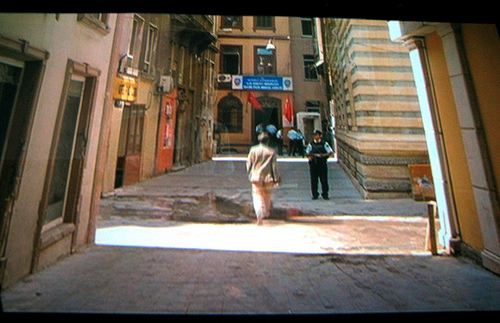Edge of Heaven
Rated M
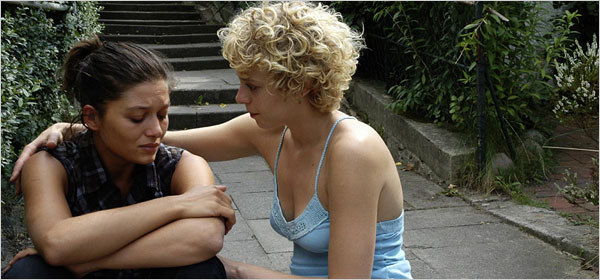
Cast
Tuncel Kurtiz as Ali Aksu, Turkish immigrant
Baki Davrak as Nejat Aksu, son of Ali, German language teacher
Nursel Köse as Yeter Öztürk, Turkish immigrant prostitute
Nurgül Yesilçay as Ayten Öztürk, daughter of Yeter, Turkish student
Patrycia Ziolkowska as Charlotte "Lotte" Staub, student
Hanna Schygulla as Susanne Staub, mother of Lotte
Filming locations
The film was shot in Bremen and Hamburg in Germany; at Taksim and Kadiköy in Istanbul, at the Black Sea coast in Trabzon in Turkey.
WHAT THE CRITICS ARE SAYING
Tying Knots That Bind Lives Despite the Divisions of Generation and Nationality
Review by A. O. SCOTT, The New York Times, May 21, 2008
There are six principal characters in "The Edge of Heaven": two mothers, two daughters, a father and a son, all arranged in more or less symmetrical pairs. In the course of this extraordinary film by the German writer-director Fatih Akin (which won the best screenplay award in Cannes last year) children are lost, lost parents are never found, and generational and geographical distances grow wider.
Yet at the same time, as the lives of the characters cross and entwine, there is a sense of human connections becoming stronger and thicker, of a fragile moral order coalescing beneath the randomness and cruelty of modern life. And even as the movie bristles with violence - accidental and systematic, sexual and political - its tone is curiously gentle.
At the beginning, Yeter (Nursel Kose), a Turkish woman who works as a prostitute in Bremen, Germany, is confronted by two menacing enforcers of Islamic morality, who demand that she renounce her sinful ways. "I repent," she says through gritted teeth, and though her words are more a rebuke than an apology, they establish one of Mr. Akin's themes. Toward the end of the film, Yeter's daughter, Ayten (Nurgul Yesilcay), is confronted by Susanne (Hanna Schygulla), a German woman (the mother of Ayten's lover, Lotte) who has suffered a terrible loss, brought about partly by Ayten's actions. Speaking no German, Ayten tries to express her overwhelming remorse in rudimentary English. "Forgiven" is the only word she can find, as if she is offering absolution instead of asking for it.
That compassion does not always come easily or express itself clearly is one of Mr. Akin's central insights. He is generous with his characters, even at their worst, but he also regards them with a measure of detachment as their good intentions go astray and their bad impulses bear terrible fruit. Similarly, while he is acutely aware of viciousness, injustice and hypocrisy in both Turkey (where his parents were born) and his native Germany, his camera absorbs the authentic beauty in both countries, from tidy Bremen to pulsing Istanbul to the tea-covered hillsides and fishing villages of the Black Sea coast.
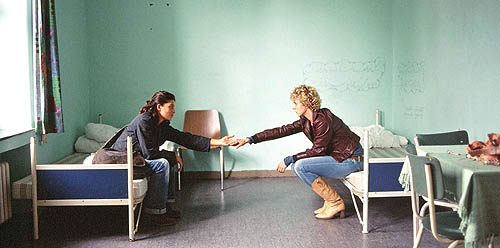
"The Edge of Heaven" is firmly rooted in these places, manifesting a local knowledge that quietly demolishes received ideas about East and West. Nejat (Baki Davrak), whose father, Ali (Tuncel Kurtiz), emigrated from Turkey, is a professor of German literature, giving lectures on /top/reference/timestopics/people/g/johann_wolfgang_von_goethe/index.html?inline=nyt-per">Goethe to sleepy college students. He is presented not as a symbol of assimilation or deracination, but as a person more or less comfortable with himself. The same cannot be said for Lotte (Patrycia Ziolkowska). Her mix of childish impulsiveness and half-baked idealism puts her at odds with her mother, Susanne, a former hippie whose accommodation to respectable middle-class life drives Lotte crazy.
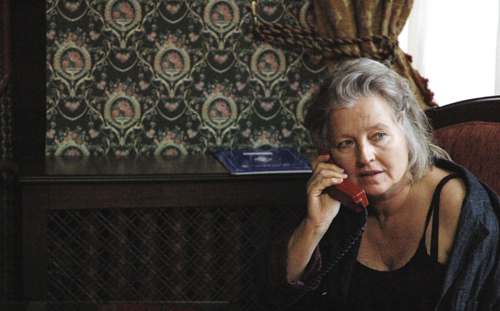
Lotte is immediately smitten with Ayten, who has fled to Germany to escape the Turkish police. It is not hard to see why. The prospect of helping a radical fugitive from an exotic country appeals to Lotte's sense of political drama, to be sure, but Ms. Yesilcay's charisma transcends ideology. With her high, wide-set cheekbones and prizefighter's hunch (she reminded me a little of Michelle Rodriguez in "Girlfight"), Ayten has a sexual magnetism that is both glamorous and predatory. Of course Lotte risks everything - her mother's love, her safety, her life - to help Ayten. Who wouldn't?
If I resist saying much more about what happens in "The Edge of Heaven," it's not for fear of giving anything away. Mr. Akin provides his own spoilers in the form of chapter titles that announce the deaths of certain characters before we have even met them. Rather than dissipate the suspense, though, these disclosures intensify it by adding an element of dread. And the shape of the narrative, a mutation of the now-pervasive "Babel" model of braided, chronologically decentered storytelling, allows for plenty of surprises and revelations.
But the main revelation is the film itself. Mr. Akin's previous fictional feature, "Head-On," was a tour de force, driven by rage and sexual desire, that traveled over similar cultural and geographical terrain at ferocious velocity. "The Edge of Heaven" has a wider scope and a more contemplative, deliberate mood, and if it doesn't match the brutal impact of "Head-On" it has a cumulative power, both intellectual and emotional, of its own. By the end you know the characters in it so well that you can't believe you've seen the movie only once, yet on a second viewing it seems completely new. And that may be because the world they inhabit is immediately recognizable - until we get to heaven, it's where we live - and like no place you''ve been before.
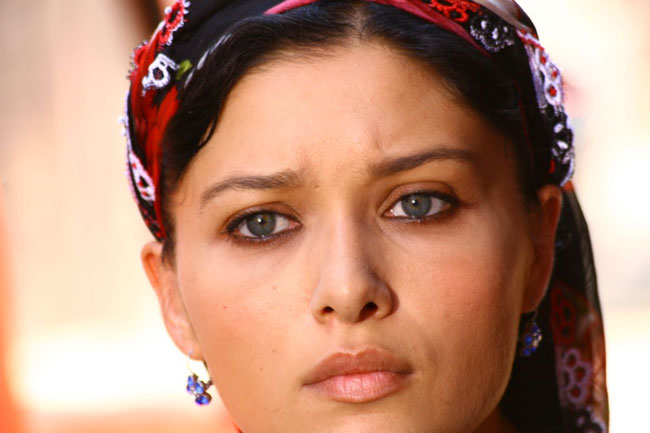
ABC - At the Movies
The fragile lives of six people connect on emotional voyages toward forgiveness and reconciliation across two divergent cultures...
The Edge Of Heaven
Rated M
Margaret: four-and-a-half stars David: four-and-a-half stars
Review by David Stratton
THE EDGE OF HEAVEN is the latest from Turkish-German director Fatih Akin who made the hardhitting drama HEAD ON in 2004.
Ali, (TUNCEL KURTIZ), an old widower living in Bremen, Germany, offers to pay Yeter, (NURSEL KOSE), a fellow Turk working as a prostitute, to live with him; afraid of threats she's received from Muslim Turks, she agrees.
Yeter's daughter, Ayten, (NURGUL YESILGAY), a member of a radical protest group in Turkey, flees to Germany searching unsuccessfully for her mother and is befriended by Lotte, (PATRYCIA ZIOLKOWSKA).
Meanwhile Nejat, Baki Davrak, Ali's son, who lectures on German history, moves to Istanbul and buys a German bookshop there.
Winner of the Best Screenplay award at Cannes last year, Fatih Akin's THE EDGE OF HEAVEN is a beautifully structured, emotionally draining drama which moves back and forth from Germany to Turkey in a seamless story of interlocking lives.
Even better than Akin's previous film, this very up-to-the-minute drama covers a good deal of ground. At a very basic level it's about the challenges faced by parents and children to relate to one another. Veteran HANNA SCHYGULLA is excellent as Lotte's mother but it's also about religious extremism, race relations, missed connections, love and life and death and loss.
All the big issues, in fact, in a story which most audiences will find tremendously moving.
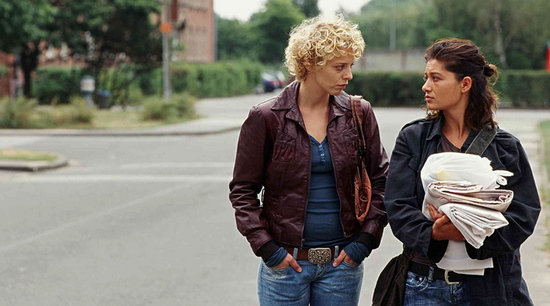
Further comments
DAVID: Did you, Margaret?
MARGARET: Yeah, I did. It's a truly excellent film.
DAVID: It's terrific, isn't it?
MARGARET: Yeah. But, you know, there's so much in it, you know? You know, the Turkish immigrants, from which Germany benefitted so much economically.
DAVID: Yes.
MARGARET: The second generation. You know, he's a professor of...
DAVID: Of German.
MARGARET: ...German. You know Goethe. You know...
DAVID: Yeah.
MARGARET: At a German university and in that beautiful scene in the bookshop, you know, that sense of 'heimweh', homesickness, that both men have. He wants to connect with his Turkish connections.
DAVID: Turkey and the other guy wants to...
MARGARET: The other guy wants to go home. The story of the women; the beautiful performances there. And it is about so many things. Guilt, accountability.
DAVID: Yeah.
MARGARET: Responsibility.
DAVID: I love the structure. I mean I love the fact that there are three sets of parents and children. There's the father and his son and two mothers and two daughters, one Turkish and one German, and there's such a symmetry to the film, and yet Fatih Akin makes these characters mix and cross and merge and so on in such a beautiful way and it's so moving in the end, I think, as well.
MARGARET: Well, and also, you know, the structure of it. You know, because two of the chapters are preface with one of the characters death, so you know that...
DAVID: Yes.
MARGARET: ...you know, that's going to happen and there's a sense of tension because you think, where is this going to come from.
DAVID: A sense of dread because you've got to like these characters
MARGARET: Yes. Yes.
DAVID: And knowing that one of them is going to die.
MARGARET: Yes, it truly is a major achievement, this film, I think.
